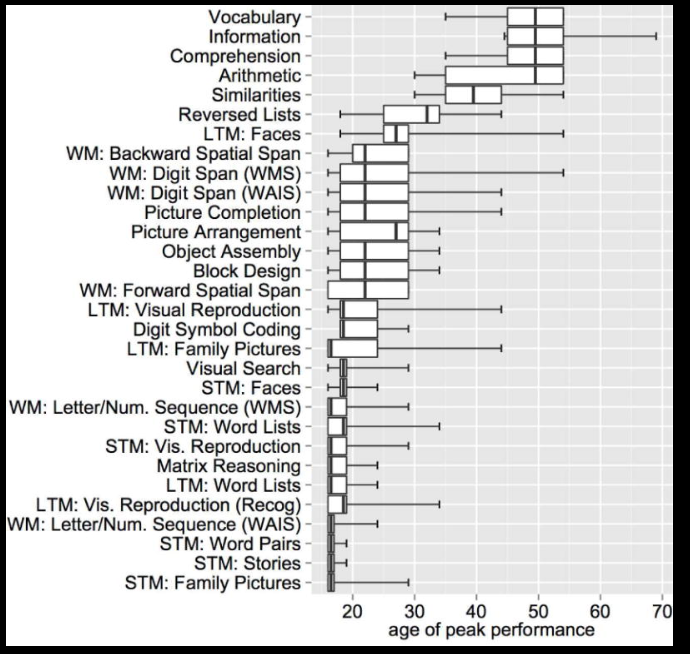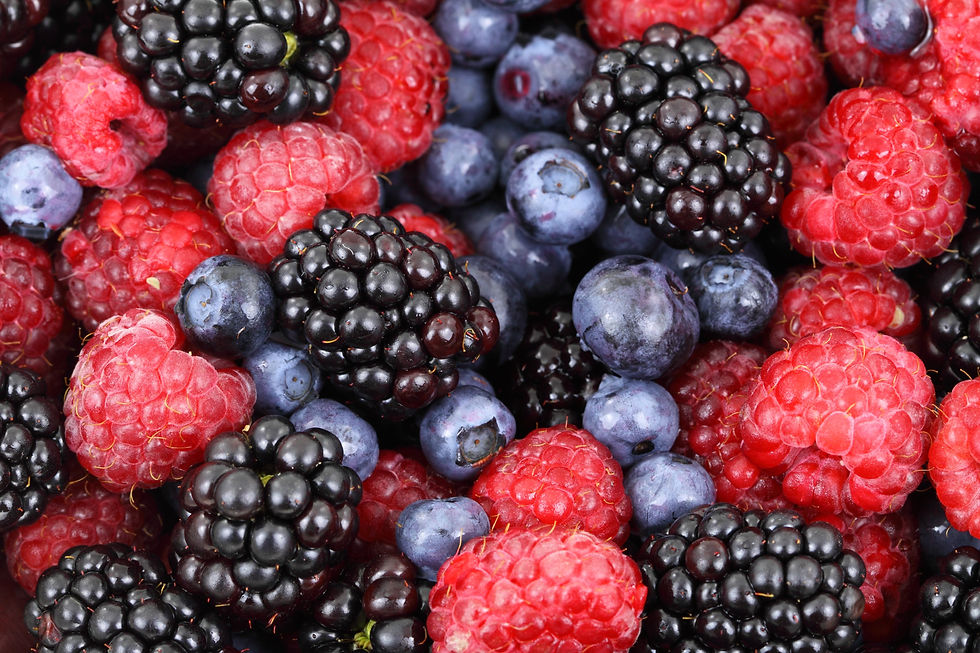Click here to listen to this article.

Food that tastes delectable AND keeps your brain in good shape? It must be too good to be true.
The brain is probably the most important organ – no offense to the heart. It is a mysterious, mushy, and malleable mass whose anatomy and physiology play directly into how we behave, what we are drawn to, and of course our cognitive abilities.
Unfortunately, our brains do not stay the same forever. Cognitive decline is a part of the aging process. Even before reaching old age, we begin to experience signs of the slow and steady reduction in brain function that takes place over the lifespan starting in our 20’s.

Hartshorne & Germine 2015: This lovely graph shows the age of peak performance for difference aspects of cognitive ability.
The good news though is that it is not necessarily all downhill from there. Some aspects of short and long term memory peak in young adulthood, while other areas of cognition like vocabulary, fortunately, peak when we reach our 50s.

...and then it's all downhill.
How well your brain works can be a very complex thing to measure. One thing that we do know is that proper nutrition plays a critical role in keeping the brain intact.
We also know that brain function declines over time more slowly for people who consume more of certain foods. Berries are one food group that has been studied pretty extensively for its effect on the brain. But, do they really boost brain function? Keep reading to find out!
Let’s talk about berries

Berries are potent antioxidant powerhouses. The blacker the berry, the richer its antioxidant content.
Berries are rich in polyphenols, which is an umbrella term for thousands of antioxidant compounds that are found in plant foods. Berries are specifically rich in a type of polyphenol called anthocyanidins. Anthocyanidins and the closely related anthocyanins, are pigments that give blueberries, blackberries, strawberries and other red/purple pigmented plant foods their characteristic colors. Beyond giving fruits and vegetables attractive colors, these pigments also function as antioxidants and help to protect eyesight and yes, brain health.
Helping the damage-prone brain
Antioxidants are important for the whole body, but the brain deserves special attention because it is highly prone to oxidative damage for two main reasons: one reason is that despite taking up just 2% of total body weight, the brain uses up roughly 20% of total oxygen intake.
The second reason is that the brain is 60% fat. The high amount of fat and oxygen in this region of the body creates a perfect storm for inflammation from oxidative damage. When there is a lot of oxidative damage, the fats, proteins, and DNA in our brains get injured, leading to what is know as neurodegeneration, aka the breakdown of our brain tissue.
Our bodies naturally produce antioxidants to help combat this damage, but we can significantly increase our body’s fighting power by ingesting antioxidants too. Enter berries.
Data on berries and brain function
There are a lot of data that connect berries to brain health.
One of the largest research studies done on this is the Nurses’ Health Study, in which they looked at the diets of over 16,000 older women and found that those who ate the most blueberries and strawberries had the slowest rates of cognitive decline. In fact, their rate of cognitive decline was slowed by an average of 2.5 years compared to those who did not eat berries as often.

Keep snacking on those cherries - your future self will thank your present self for it.
Clinical trials have typically been done on older adults, given that signs of cognitive decline normally become more evident with the passage of the years, leading to there being more room for notable improvement. In multiple clinical trials, consuming either blueberry concentrate, blueberry juice, or the equivalent of 1 cup of fresh blueberries every day for 3 months all led to better brain function.
Specifically, berries, alone or in combination with other antioxidant-rich foods like chocolate, have been shown to improve executive functions. This is a technical term in the world of psychology that is used to describe basic cognitive processes like:
Working memory (the ability to hold information in your mind and use it to make sense of information that comes along later, like when you are reading a sentence or doing mental math),
Attentional control (the ability to resist acting impulsively),
Interference control (the ability to focus on one thing and suppress input from other stimuli), and
Flexible thinking (being able to think outside the box and adapt to new situations). Executive functions affect our ability to focus, regulate emotions, and think creatively.
Of note, these benefits came from chronic intake of berries, not acute intake. So, eating berries for a day or two won’t really slow cognitive decline, but eating them regularly for a long time can. Slow and steady wins the race.
How do berries confer all these benefits? Let’s talk about the mechanisms.
Berries work in multiple ways to protect our mental capabilities. To avoid dragging on too much, I am only going to mention a few. Eating berries:
Reduces the expression of genetic pathways that promote inflammation in the hippocampus, a part of the brain which is important for learning and memory
Increases insulin-like growth factor-1 (IGF-1), which is a trophic factor, meaning that it fuels the growth of neurons
Increases cerebral perfusion, or blood flow to the brain
One more thing I would like to add is that berries may also help to improve cognition through their effect on the gut microbiome. Flavonoids act as prebiotics, meaning that they help to promote the growth of healthy gut bacteria. The gut bacteria in turn break down the flavonoids to produce metabolites that support cognitive health. Yes, what you heard is correct – the flavonoids promote the growth of the same bacteria that eat them. These beneficial microbes in the colon also produce neurotransmitters such as γ-amino butyric acid (GABA).

GABA helps us to feel relaxed, and low levels of GABA have been linked to insomnia, anxiety, depression, and other mood disorders.
Conclusion
Berries are scientifically proven to protect your brain from damage over time. While they may not necessarily make you smarter, they can help you to maintain the smarts that you already have for more years into the future.
Quick side note: frozen berries are a good option and are not less effective than fresh. In fact, for some of the research studies that I included in this article, they used frozen blueberries in order to produce those brain-boosting benefits.
If you learned anything new or think that someone you care about could benefit from this information, share this article, and subscribe to the blog for regular updates on commonly asked nutrition questions.
Enjoy today!
References:
Anand, K. S., & Dhikav, V. (2012). Hippocampus in health and disease: An overview. Annals of Indian Academy of Neurology, 15(4), 239–246. https://doi.org/10.4103/0972-2327.104323
Bowtell, J. L., Aboo-Bakkar, Z., Conway, M. E., Adlam, A. R., Fulford, J. (2017). Enhanced task-related brain activation and resting perfusion in healthy older adults after chronic blueberry supplementation. Applied Physiology, Nutrition, and Metabolism. 42(7):773-779.
Casadesus, G., Shukitt-Hale, B., Stellwagen, H. M., Zhu, X., Lee, H. G., Smith, M. A., Joseph, J. A. (2004). Modulation of hippocampal plasticity and cognitive behavior by short-term blueberry supplementation in aged rats. Nutritional Neuroscience. 7(5-6):309-16.
Cheng, N., Bell, L., Lamport, D. J., Williams, C. M. (2022). Dietary Flavonoids and Human Cognition: A Meta-Analysis. Molecular Nutrition & Food Research. e2100976.
Clark, D. D., & Sokoloff, L. Basic Neurochemistry: Molecular, Cellular and Medical Aspects. Lippincott, Philadelphia1999.
Devore, E. E., Kang, J. H., Breteler, M. M., Grodstein, F. (2012). Dietary intakes of berries and flavonoids in relation to cognitive decline. Annals of Neurology. 72(1):135-43.
Diamond, A. (2013). Executive functions. Annual Review of Psychology. (64)135–168.
Dias, T. R., Martin-Hidalgo, D., Silva, B. M., Oliveira, P. F., Alves, M. G. (2020). Endogenous and Exogenous Antioxidants As a Tool to Ameliorate Male Infertility Induced by Reactive Oxygen Species. Antioxidants and Redox Signaling. 33(11).
García-Cordero, J., Pino, A., Cuevas, C., Puertas-Martín, V., San Román, R., de Pascual-Teresa, S. (2021). Neurocognitive Effects of Cocoa and Red-Berries Consumption in Healthy Adults. Nutrients. 14(1):1.
Hartshorne, J. K., & Germine, L. T. (2015). When does cognitive functioning peak? The asynchronous rise and fall of different cognitive abilities across the life span. Psychological Science. 26(4):433-443.
Khoo, H. E., Azlan, A., Tang, S. T., & Lim, S. M. (2017). Anthocyanidins and anthocyanins: colored pigments as food, pharmaceutical ingredients, and the potential health benefits. Food & nutrition research, 61(1), 1361779.
Krikorian, R., Shidler, M. D., Nash, T. A., Kalt, W., Vinqvist-Tymchuk, M. R., Shukitt-Hale, B., & Joseph, J. A. (2010). Blueberry supplementation improves memory in older adults. Journal of agricultural and food chemistry, 58(7), 3996–4000.
Melzer, T. M., Manosso, L. M., Yau, S. Y., Gil-Mohapel, J., & Brocardo, P. S. (2021). In Pursuit of Healthy Aging: Effects of Nutrition on Brain Function. International journal of molecular sciences, 22(9), 5026. https://doi.org/10.3390/ijms22095026
Miller, M. G., Hamilton, D. A., Joseph, J. A., Shukitt-Hale, B. (2018). Dietary blueberry improves cognition among older adults in a randomized, double-blind, placebo-controlled trial. European Journal of Nutrition. 57(3):1169-1180.
Mohler, H. (2012). The GABA system in anxiety and depression and its therapeutic potential. Neuropharmacology, 42-53.
Winiarska-Mieczan, A., Baranowska-Wojcik, E., Kwiecien, M, et al. (2020). The Role of Dietary Antioxidants in the Pathogenesis of Neurodegenerative Diseases and Their Impact on Cerebral Oxidoreductive Balance. Nutrients.12(2).

Comments